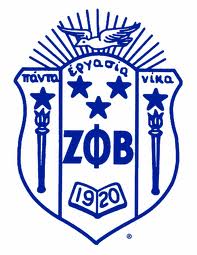
A 1947 Afro-American newspaperarticle mentions Zeta Phi Beta establishing its first Greek letter chapter on the Eastern Shore at what would still have been Princess Anne College. Fraternal brothers Phi Beta Sigma welcomed the chapter to campus.
During its time here, Zetas in Princess Anne participated in the Adopt-a-Highway program and also were involved with grocery donations to needy families during the holiday season.
They held Christmas parties for children as well as toy drives. Finer Womanhood Week was celebrated with a local Woman of the Year award.
For fun activities, members held cookouts, participated in Homecoming step shows and held their “Blue and White” Weekend to showcase Zeta spirit. The Eta Beta chapter currently is inactive at UMES.
Nicknamed “Sisters of the Dove” for their symbol, the sorority was founded Jan. 16, 1920 at Howard University by 5 women with close ties to Phi Beta Sigma fraternity. As a result, it is known as the first black Greek Letter sorority constitutionally bound to a fraternity. Represented by the colors royal blue and pure white, members pledge to uphold the principles of “Scholarship, Service, Sisterhood and Finer Womanhood.” They also are known for the high academic standards required for induction into the sorority.
Civil rights and activism:
In the 1930s, Zeta Phi Beta became associated with the NAACP and the National Negro Congress. It also was the first Greek letter organization to develop a chapter in Africa in 1948. Meeting in 1957 at a joint national conference with Phi Beta Sigma in Dallas, nine black high school students were in the process of integrating all-white Central High School in Little Rock when they were blocked by Arkansas National Guard troops. The conference offered a citation and $500 check for the students.
As the United States moved toward integration in the 1960s, Zeta Phi Beta opened up membership to non-African American women. They also reaffirmed their commitment to the NAACP and the American Council on Human Rights, and became affiliated with many other organizations, including: the White House Conference on Children and Youth, National Conference on Negro Women, United Negro College Fund and the Assembly for Civil Rights.
Programs/Projects:
Zeta Phi Beta developed its “Finer Womanhood Week” in the 1920s as a national celebration. By the 1940s it evolved into a “Woman of the Year” program honoring women who exemplified the sorority’s values and as well as refined social graces of the era.
Training future Zeta notables is the aim of the Zeta Organizational Leadership program. It is a future-focused, nationally structured, leadership training program. Zeta Phi Beta experts in their fields developed the program across a variety of disciplines.
Zeta Phi Beta’s “Stork’s Nest” program began in 1972 in partnership with the March of Dimes to encourage women to seek prenatal care. Its National Education Foundation supports the Human Genome Project, which began in 1990 to identify approximately 30,000 genes in human DNA in hopes finding treatments and cures to diseases and illnesses.
Aligning it with numerous health organizations, African-American and women’s causes, Zeta Phi Beta also is affiliated with the United Nations as a non-governmental organization. Members have helped monitor and implement international agreements, provided expertise, offered humanitarian aid, brought citizens’ concerns to governments and encouraged participation in civil matters at the community level.
Members of note:
- Violette Anderson –first black woman to practice law before U.S. Supreme Court
- Julia Carson – member of Congress, Indiana
- Rear Admiral Evelyn J. Fields – National Oceanic and Atmospheric Administration director
- Zora Neale Hurston – author, anthropologist and folklorist
- Dr. Elizabeth Koontz – first black president of the National Education Association
- Curlie E. McGruder – civil rights activist
- Esther Rolle – actress
- Sarah Lois Vaughn – renowned jazz singer
- Dionne Warwick –international recording artist
- Deborah Wolfe – pioneering educator
— Frederick Douglass Library archives staff

